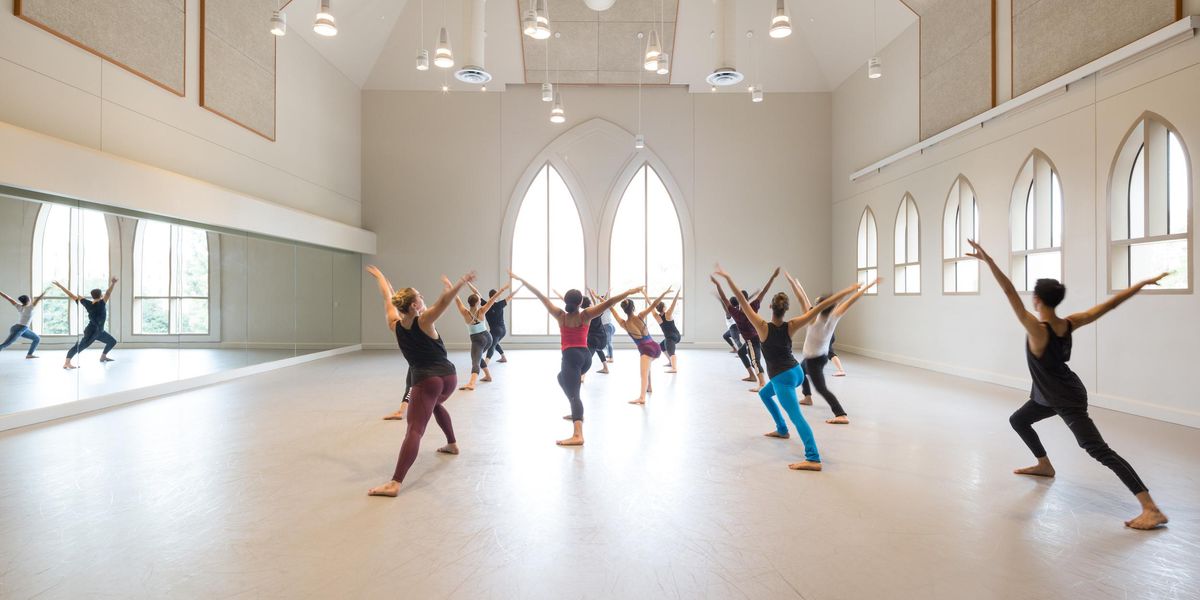DanceWorks Chicago/Muntu Dance Theatre of Chicago
North Shore Center for the Performing Arts
Skokie, IL
May 11–12, 2012
Performance reviewed: May 12, 8pm
Contemporary concert dance and traditional cultural dances generally inhabit different theatrical universes. But thanks to an initiative by Dance/USA and MetLife—which started in Philadelphia and recently expanded to Chicago and San Francisco—several Chicago troupes with different missions have shared a stage over the last several months. The most recent pairing was particularly adventurous: Muntu Dance Theatre of Chicago, which specializes in West African dance and percussion, and DanceWorks Chicago, a contemporary repertory company for early-career dancers.
Mostly alternating works, DWC and Muntu created a head-spinning program in which each troupe set the other off, highlighting its distinctive character and appeal. For both companies, however, the goal seemed the same: to seduce us.
Celebrating community, Muntu’s ensemble works flooded the stage and broke down the fourth wall. Smiling at the audience, dancers and musicians shared their exhilaration with us; heads bobbed and limbs pumped in polyrhythms. Meanwhile DWC celebrated the individual in frequent solos and duets, showcasing the classical control required to extend and hold the limbs. Behind a sturdier fourth wall, the dancers remained at one remove, acting out meaning or feeling. Partnering one another, they seduced us by proxy.
Demetrius McClendon and Marissa Horton of DanceWorks and Amansu Eason and Errin Berry of Muntu in Monique Haley’s
See(in) Me
The program’s one new work was collaborative: an emotionally charged, formally complex quartet choreographed by former River North Dance Chicago member Monique Haley and performed by Muntu’s Errin Berry and Amansu Eason and DWC’s Marissa Horton and Demetrius McClendon. Set to snippets of house and post-rock instrumental music, the chameleonic See(in) Me melded the African and contemporary vocabularies, extroversion and intimate contemplation. Both sets of dancers were challenged to work outside their technical and emotional comfort zones. Without exactly being unique—Ronald K. Brown came to mind—the provocative See(in) Me was both tantalizingly mysterious and kinetically gripping.
In the evening’s other collaboration, the Muntu musicians accompanied DWC’s performance of Alex Ketley’s 2008 If Ever (an Ocean) Relinquished, created for DWC to perform to various scores. Playing a talking drum, a flute, and chimes, the Muntu musicians gave their seemingly improvised music a smooth jazz feel. That essentially cheerful sound worked fine once the piece’s three couples finally reconciled, but not so well during the dance’s initial two-thirds, when each couple was at loggerheads.
Edgar Zendejas’s sinuous Sada, Harrison McEldowney’s playful Call the Whole Thing Off, and James Gregg’s luscious Nocturnal Sense completed DWC’s contribution. Muntu’s half included two percussion works, three pieces by Moustapha Bangoura (including a Guinean women’s dance, Sorsorne, and men’s dance, Hamana), and Muntu artistic director Amaniyea Payne’s Djalli Dong.
But no matter what the form—“pure” or hybrid, in-your-face or oblique—it resulted in a happy marriage of opposites. More such partnerships would benefit dancers and audiences alike.
All photos by Vin, courtesy DanceWorks Chicago
Pictured at top: Errin Berry of Muntu Dance Theatre in Monique Haley’s
See(in) Me.




